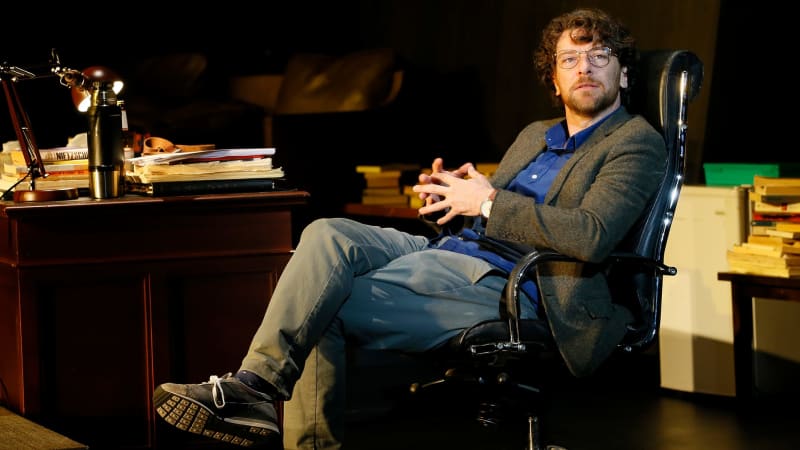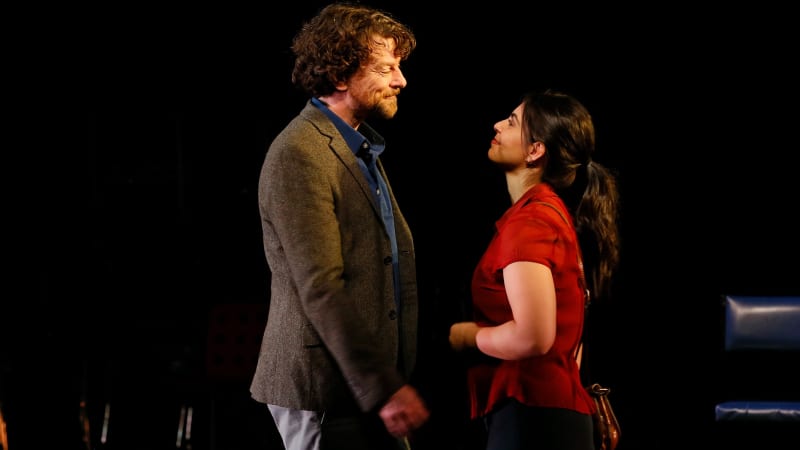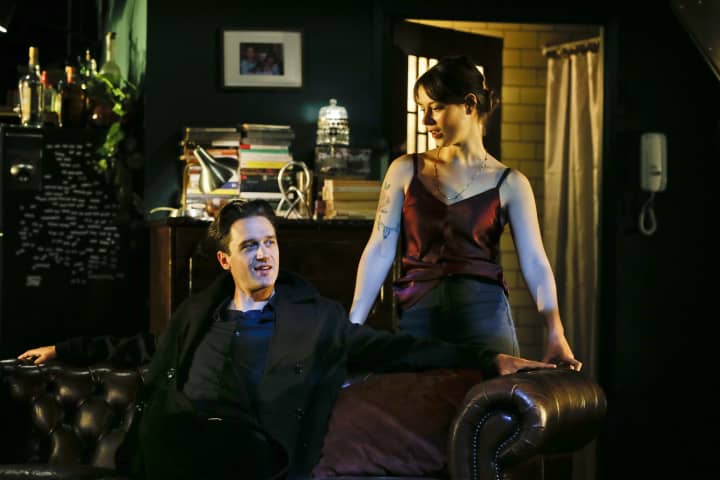‘Being at the coalface of intimacy coordination work, it’s easy to forget how new the idea is within broader society.’ As part of an expansive conversation about the current state of theatre in Australia – in a COVID-normal world grappling with the ongoing reckonings of #MeToo and #BlackLivesMatter, among other issues – Dan Spielman is in a thoughtful mood.
Over the past year the actor has been heavily involved with drafting the new intimacy guidelines for the Australian performing arts industries*, but his first experience of working with them in the rehearsal room came during his recent MTC show, Sexual Misconduct of the Middle Classes – currently streaming on-demand as part of MTC Digital Theatre.
In Sexual Misconduct, Spielman plays a famous forty-something novelist and university professor who has an ostensibly consensual affair with his 19-year-old student. It’s a deeply nuanced take on a deeply complex subject, but Spielman admits he was initially a bit hesitant about the play. ‘I think we all had a slightly resistant reaction at first,’ he says, ‘because it involves a man – a straight, white, powerful man – talking so much. So at first we were all a bit ambivalent, but in exploring the text we all saw that what [playwright Hannah Moscovitch] was doing was much, much more interesting than that.’
As an interrogation of consent, power and the grey line that connects them, the play speaks to a highly topical yet unfortunately evergreen conversation Australia is having with itself at the moment. Its themes were also reflected in the real life of rehearsals. ‘The way a man and a woman interact physically in any given power dynamic, it touches on so many issues that are at fly out there in society at the moment. That’s true in the play, but it was also true in the room,’ says Spielman. ‘I’m someone who’s had 25 years of experience. I’m male, I’m white, I’m privileged and I’m aware that Izabella [Yena, his co-star] is young, she hasn’t had as much experience. So the dynamic in the room was worth noting.’
Intimacy in practice
Spielman went into rehearsals armed with all the knowledge and insight gained from his behind-the-scenes involvement with the intimacy guidelines, but it was his first experience as an actor of actually working with an intimacy coordinator. ‘That was a really important part of my grasp of the work,’ he muses. ‘Me with my actor’s hat on, feeling what it’s like rather than intellectually knowing who should be protected and how.’
‘A great deal can be achieved with consent. That’s one side of the coin. On the other is that a lot of damage can be done without it.’
Interestingly, he admits to finding the mechanics of intimacy coordination somewhat awkward at first, like it was slowing down the rehearsal momentum ‘to an excruciating degree’. The experience initially made him question if they’d even make it to the stage. But such questions are irrelevant he says bluntly. ‘A great deal can be achieved with consent. That’s one side of the coin. On the other is that a lot of damage can be done without it. It’s interesting to feel how profoundly different it is to actually ask permission to touch somebody. But it’s absolutely necessary. And it genuinely felt profoundly powerful, even though it slowed everything down.’
Having now experienced both sides of the equation, Spielman is confident that not only will the process result in safer workplaces – for everybody – it will become the norm. And in so doing, it will also help normalise other important conversations that don’t necessarily fall under the definition of what we call intimacy. ‘Within that,’ he elaborates, ‘is the seed of a much broader appreciation of what safety and consent means for all sorts of people with varied backgrounds, different lived experiences. It’s kind of the thin end of the wedge to make these buildings, and these rooms, safer for all sorts of different people for all sorts of different reasons.’

Dan Spielman as Jon in Sexual Misconduct of the Middle Classes
Photo: Jeff Busby
Dan Spielman as Jon in Sexual Misconduct of the Middle Classes
Photo: Jeff Busby
Dan Spielman as Jon in Sexual Misconduct of the Middle Classes
Photo: Jeff Busby
Dan Spielman and Izabella Yena share an intimate embrace onstage in Sexual Misconduct of the Middle Classes
Photo: Jeff Busby
Dan Spielman and Izabella Yena in Sexual Misconduct of the Middle Classes
Photo: Jeff BusbyAccess all areas
That broader context extends to making the theatre more accessible. ‘I think people generally appreciate the value of storytelling,’ he explains. ‘But sadly, because of the way this industry works, tickets for live performance are prohibitively expensive. Fundamentally the theatre, as it stands, is not open, it’s not fully accessible. But if the access is ready then you’ll get more people along, including people from diverse cultures, backgrounds and lived experiences who value storytelling in many different ways.’
It’s for this reason that Spielman has cherished being part of MTC’s first foray into digital theatre. ‘It’s really exciting,’ he says. ‘Notwithstanding the fact that it’s not live, it does present great accessibility. And it just feels good to be doing it. I feel extraordinarily lucky to find myself in a position where this stuff that I’m interested in as an artist and as a human is an inherent, integral part of the work that I’m doing, at a point where a huge reckoning and significant cultural shifts have taken place at lightning speed.’
Continuing, and honing in on his point, he says that ‘the work that went into the intimacy guidelines sprang up very recently in Australia and now we’ve got practitioners in a room, on a production that deals very intelligently with these issues, that is brilliantly tailored for its audience, and that has been recorded properly, in a sophisticated way, so that it will maybe reach more people. The confluence of all of these things is incredibly exciting and humbling for me, and I feel very privileged. This little thing that we’re doing here feels very right. And I’m really honoured to be part of it.’
*MTC has been working with an intimacy coordinator since 2019, using guidelines that existed in the UK. The Australian guidelines were published recently by the MEAA.
The digital season of Sexual Misconduct of the Middle Classes streams until 16 May. Tickets are available now.
Published on 5 May 2021





